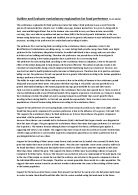Outline and evaluate evolutionary explanations for food preferences
When the world began human kind was primitive and people had to hunt to find food. Therefore the early human diet consisted of deer, berries, nuts and rodent size animals. As the world evolved so did our taste buds which have now been established as sweet, sour, salt, bitter and umami. Each taste bud is essential for the survival of human kind. Salt is necessary in our diets for survival as without it we would dehydrate and die. There is not a large amount of salt within the human diet because it can lead to high blood pressure and other associated health risks. Fessler (2003) assumed salt was so essential that humans are expected to have a uniform preference for salty foods and natural selection would have removed these differences. However, there are differences in salt preference which he explains by references to the fact that high salt intake protects against sudden dehydration. He believed that an adaptive mechanism calculates salt preferences as a function of the risk of dehydration as indicated by past experience of dehydration and maternal salt intake. There has been no key research to support Fessler’s theory and so it may not be reliable in explaining why humans incorporate salt in their diet.







